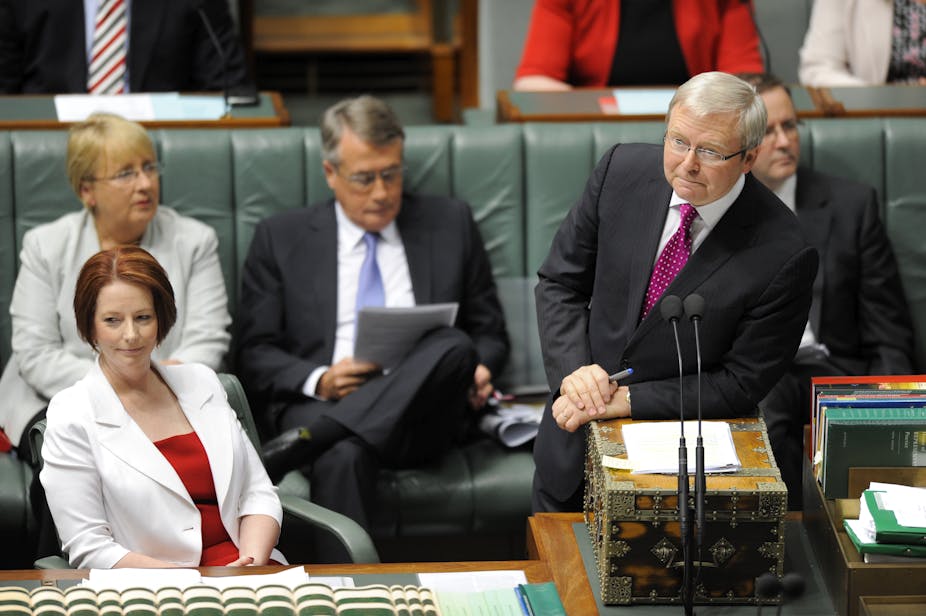It is fitting that Kevin Rudd’s official campaign for a return to the Labor leadership commenced in the United States, for his political project is one forged in the image of what many Australians imagine American presidential politics to be like: populist, and based on a direct appeal to the people in a way that bypasses parliamentary politics.
Rudd’s appeal is to public opinion. Both he and his supporters argue he has the magic quality of “electability” that will enable him to defeat Tony Abbott, just as he saw off John Howard. But within the Labor caucus many view him with distrust as an egotist who went his own way and was never really “one of us”.
Julia Gillard, on the other hand, was born in Wales and her political appeal has echoed the themes of the Westminster tradition. That politics is about parliament. She argues that she knows how to make parliament work as demonstrated by her government’s legislative achievements. Words such as “method” and “discipline” are important in her promotion of herself as a proven performer in a Westminster system.
Unfortunately for the prime minister, this appeal has cut little ice with voters, in part this is because some parts of her legislative program are unpopular, such as the carbon tax. Even Labor’s apparently popular legislative initiatives, such as the mining tax and the National Broadband Network have failed to inspire. Tony Abbott has, with some success, characterised her government as the illegitimate outcome of a fusion of caucus and parliamentary dealing.
Labor faces a dilemma because both the Rudd and Gillard models have proved wanting. Labor MPs are still aware of how quickly the euphoria of Kevin07 ebbed.
At one level, Rudd can be likened to Bob Hawke. Both leaders overwhelmed sceptical caucus colleagues by the force of their appeal to voters, but neither was a great parliamentarian. Both of their rivals, Paul Keating and Julia Gillard, were masters of the parliamentary game. In the 1980s, however, Hawke’s appeal was corporatist as well as populist. His government championed a partnership with social movements, in particular the trade unions.
Rudd definitely lacked Hawke’s interpersonal skills, but Australian society has radically changed from the 1980s. In an individualised society in which the base for collective social action has declined, Rudd’s populism was detached from a social base. Once Kevin07 became a memory, Rudd’s appeal to a fickle electorate evaporated. Here we compare the experience of Rudd with Barack Obama. Like Rudd, Obama triumphed as an outsider who promised a new politics, like Rudd he has struggled to deliver on his promises.
The difference is that American society is deeply divided by chasms of ethnicity, class and culture, thus American presidents even in bad times can usually count on a solid base of support. The separation of powers and the frequency of elections means voters can blame one of the major parties when things go wrong.
In a time of economic crisis unhappy Europeans blame the “system” and support new populist parties of the left or right, while Americans are more likely to blame either a Democratic president, or a Republican Congress, or vice versa. Australia is currently fortunate compared to the US, even if the bitter contest between Gillard and Rudd resembles the American primaries in its viciousness.
In a time of prosperity, Australians celebrate their right to shift their support rapidly from one party to the other. Kevin12 or Kevin13 is unlikely to prevent the completion of this cycle.

